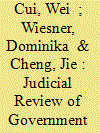| Srl | Item |
| 1 |
ID:
084745


|
|
|
|
|
| Publication |
2008.
|
| Summary/Abstract |
This paper uses an agricultural trade policy simulation model to quantitatively evaluate the effects of Blue Box policy reform on agricultural production and trade, and further provides specific proposals regarding China's reform position. The results indicate that, if the reform could achieve a reduction in distorting supports in more developed countries, China's total agricultural production would increase, accompanied by a decrease in agricultural imports and a slight increase in exports. In terms of social welfare, producers would gain significantly, consumers would lose and government would not suffer greatly, which is in accordance with current agricultural policies in China. As a core member of G20, China should approve a subsidy level as low as possible required by Blue Box to achieve "substantial reductions in trade-distorting domestic supports".
|
|
|
|
|
|
|
|
|
|
|
|
|
|
|
|
| 2 |
ID:
166096


|
|
|
|
|
| Summary/Abstract |
The judicial review of government actions is often used as a bellwether of the government’s attitude towards the rule of law in China. Accordingly, in gauging the direction of legal reform in the Xi era, media reports have highlighted changes in litigation against government agencies as evidence of positive movement towards greater rule of law. We provide a selective review of changes in China’s administrative litigation system in the last few years, giving special attention to the amendment in 2014 of the Administrative Litigation Law (ALL), and a 2018 Supreme People’s Court Interpretation of the same statute. In our view, the question of whether lawsuits might be brought against the government has arguably been superseded in importance by the question of how courts will decide such lawsuits. And the generic notion of judicial independence itself no longer sheds sufficient light on actual and possible judicial responses. Using the purportedly expanded scope of review of informal policy directives as an example, we show that symbolism-motivated advocacy to improve the administrative litigation in China may come at the expense of protecting the non-symbolic functions of judicial review, e.g., the coherence of law and consistency in the delivery of justice.
|
|
|
|
|
|
|
|
|
|
|
|
|
|
|
|